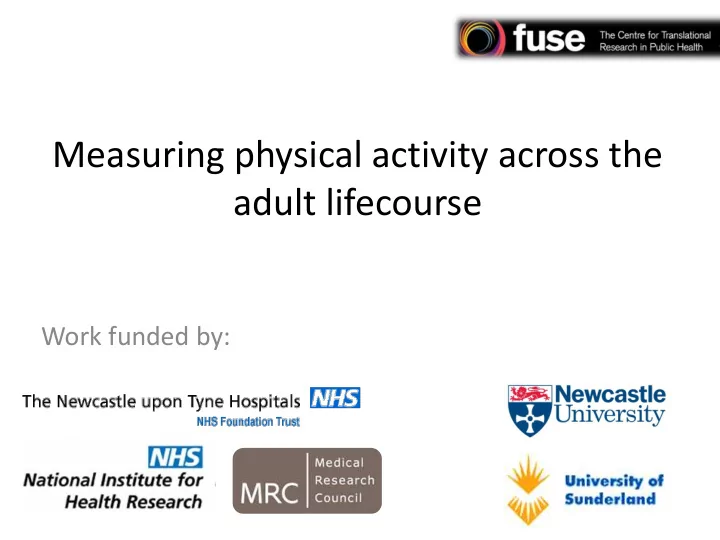

Measuring physical activity across the adult lifecourse Work funded by:
Overview • PA changes Need accurate with age measures of PA • More older across the life course people • Accelerometer Large data sets with scalable space and • Cloud technology custom analytics
The ageing population Until 1920s: Improvements in infant and childhood survival combating of infectious diseases at young ages Since 1950s: Improvements in clinical care Christenson K. et al. Lancet 2009 3; 374(9696): 1196 – 1208
The demographic shift Number of people 2005 (red projected line) Number of people 2025 (blue, projected line) The population of Germany by age in a single year. Vaupel L. Nature Insight. 2010 Data from Human Mortality Databases
Physical activity and ageing “Ageing is inevitable and cannot be stopped, however many aspects of ageing are malleable to what we do to ourselves how our behaviours are accumulated” Kirkwood T. Great British Science Festival. Newcastle University Newcastle upon Tyne. 2013 Ageing seen at the cell and tissue level Metabolic and hormonal changes Immunological changes Loss of neurological tissue, bone, skeletal muscle mass. Circadian dysregulation
How ageing makes us move differently A contour plot of intra-stride change in inter-joint coordination [i.e., median R t ( s )] for a young person ( A ) and a healthy older person ( B ). Red contours represent strong inter-joint coordination coupling [i.e., large median R t ( s )] more pronounced in the pre-swing of the younger person compared with the older person. SL, same leg; OL, opposite l Espen A. F. Ilene. Journal of Applied Physiology Vol. 117 no. 2, 189-198 2014
Basal metabolic rate Cognitive decline Sarcopenia Immunity Proprioception Metabolic control Bone mineral density Insulin sensitivity Physical function Inflammatory factors A loss of ADL’s and IADL Energy expenditure Chronic disease
Life course research from epidemiology Epidemiological 1948 Framingham Heart study 1950’s Seminal work of JN Morris et al 1960’s Whitehall I Study (>n=18,000 civil servants) conducted over 10 years 1970’s NHANES (National Health and Nutrition Examination Survey) 1980’s Whitehall II Study, (n=10,308 civil servants aged 35 to 55) Jerry N Morris 1956 1992 EPIC-Norfolk study (n=30,000) Since 2000 -AUSDiab -Hertfordshire cohort study -English Longitudinal Study for Ageing -UKBiobank (n=500,000) >100’s publications documenting the hazards of an inactive lifestyle and benefits of an active lifestyle.
King AC, Haskell WL, Taylor CB, Kraemer HC, DeBusk RF. Group vs. home-based exercise training in healthy older men and women: a community-based clinical trial. JAMA 1991;266:1535 – 42. Minimum 15 mins physical activity per day?
The International Physical Activity Questionnaire (IPAQ) Cost effective Easy to implement Standardised Can compare data globally Bauman A et al. Journal of Physical Activity and Health, 2009, 6(Suppl 1), S5 – Limitations: S8 Tested in adults 18 to 69 years old but is often used with younger adolescents or older adults. Recall bias Social desirability Correlations between self-report and direct measures were generally low-to-moderate and ranged from -0.71 to 0.96. Prince et al. International Journal of Behavioural Nutrition and Physical Activity 2008, 5 :56
History of accelerometery Cavagna et al 1979 published the first activiy monitor External work in walking. J. Appl. Physiol. I 8 (I )F Montoye 1983 estimated energy expenditure of six daily activities using a mechanical switch system to give ‘count’. Subsequently commercial monitors use ‘counts’
Inconsistent use of accelerometer methods in older adults results in incomparable data • MVPA ranged from 4-80mins/day • Sedentary time 62-85% of the day
The move toward raw accelerometry Used in : UKBiobank (n=250,000) Mike Catt Professor of Translational Research Whitehall II (n=3,975) Newcastle 85+ (n=357) Pelotas Birth Cohort (n=8,974) Most commonly used to estimate time spent in activity intensity zones: • Light • Moderate • Moderate to vigorous PA (MVPA)
Current advances in algorithm development Published analyses in children, young and middle aged adults but still required for older adults – Esliger et al – validated at both wrists, 49.9yrs Esliger at al 2012 Med Sci inSport & EX – Phillips et al – validated wrist/waist in 44 children age 8-14yrs Phillips et al 2012 J Sp Ex Sci – Hildebrand- validated wrist/waist 9 yrs and 24yrs Hildebrand at al 2014 Med Sci inSport & EX – Shaeffer et al- validated wrist/hip 22 children aged 9-11yrs Scheaffer at al 2012 Med Sci inSport & EX – Innerd et al - validated wrist/waist/chest/ankle in young and older adults – 15 adults aged 29 yrs 15 adults aged 66yrs. • cut-points for older adults • Wrist and waist less comparable at higher intensity activity Innerd et al (unpublished data) 2016
Overview • Pa changes Need suitable with age methods for use • More older across the life course people • Accelerometer Large data sets with scalable space and • Cloud technology custom analytics
Future directions: Real time data to guide clinical care pathways Patient Researcher Clinician
Measuring physical activity across the adult lifecourse Work funded by:
Recommend
More recommend